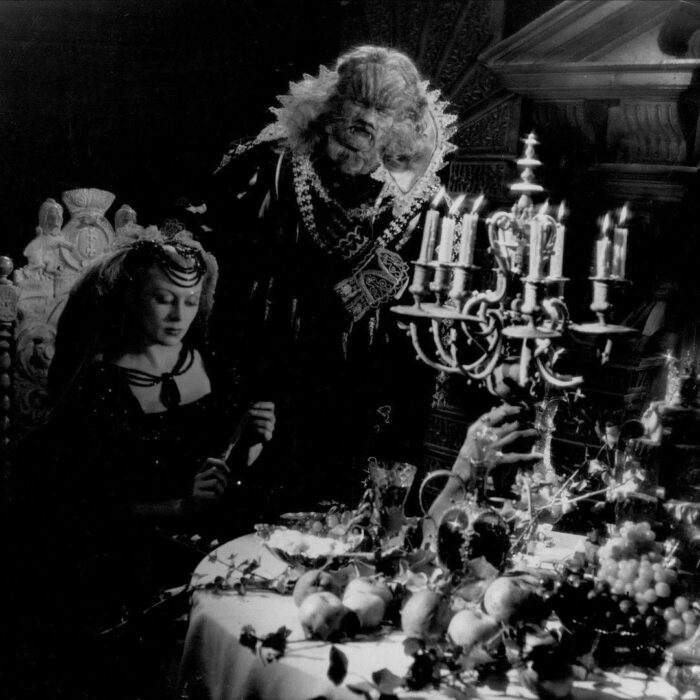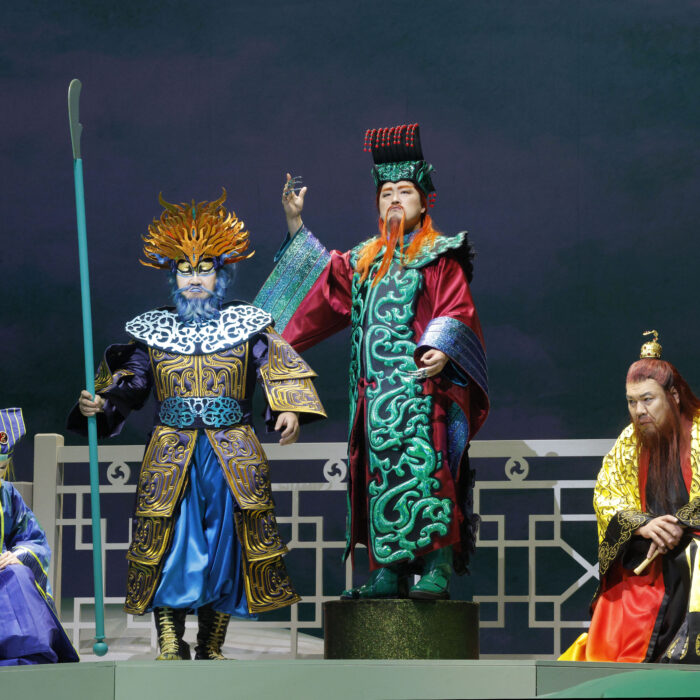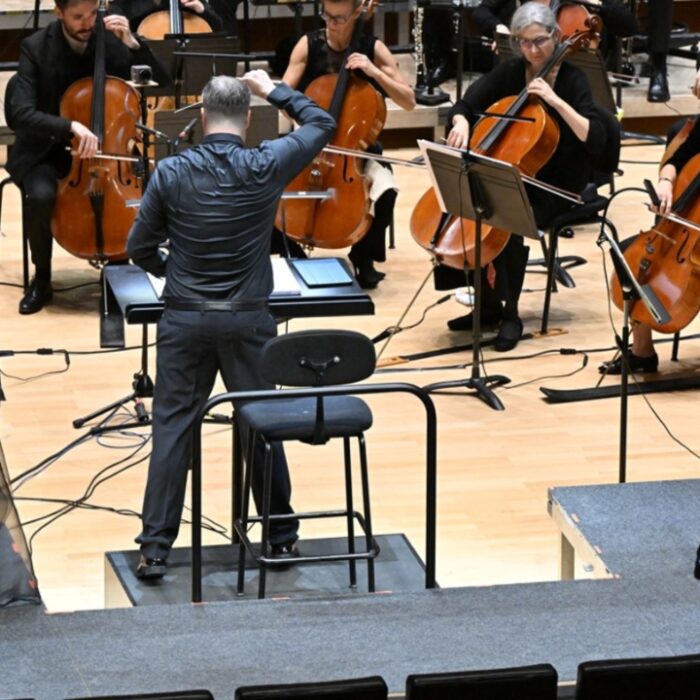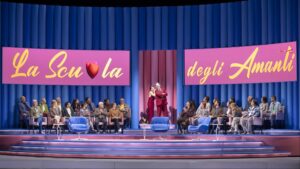
Teatro alla Scala 2024-25 Review: Così fan tutte
By Bernardo Gaitan(Photo: © Vito Lorusso / Teatro alla Scala)
During the Classical period, audiences entertained themselves with theatrical farces, literary comedies and other artistic forms that, besides amusing, also served as social critique. “Così fan tutte,” premiered in Vienna in 1790, is a direct heir to that tradition. Mozart’s work explores seduction, fidelity and the illusion of love. Its characters take part in a “social experiment” devised by Don Alfonso to test human nature and emotional bonds. Over time, the opera has continued to spark debate. Mozart and Da Ponte built a symmetrical structure full of intrigue, identity swaps and disguise, but also shaped by a deeply humanistic message: Don Alfonso not only manipulates but seeks to help the young lovers recognize their own fragility and learn to love themselves as they are.
Production Details
Teatro alla Scala closed its 2024-25 season with a new production by acclaimed stage director Robert Carsen who, true to his style, offers a contemporary reading that is as ingenious as it is coherent. Carsen relocates the action to the world of modern television, turning the protagonists into contestants on a dating reality show: a mix of Temptation Island, The Bachelor, Perfect Match, etc. a universe now saturated with such formats. The show, titled “La scuola degli amanti” (The School for Lovers), the opera’s original subtitle, tests the strength of the couples and exposes them to temptations, just as in real-life reality TV.
This shift to the contemporary media landscape is far more than an aesthetic gesture: Carsen uses it as a powerful metaphor. He modernizes what in the Classical era functioned as social critique and applies it to the present, revealing the intellectual poverty that dominates much of today’s television. Despite their low level and artificial dynamics, these programs still attract massive audiences. According to the regista, modern relationships are shaped by public display, performativity, the spectacle of intimacy and the tension between the real and the mediated. Don Alfonso and Despina thus lose their traditional roles as mere manipulators and become the show’s hosts.
Together with set designer Luis F. Carvalho, Carsen replaces the theatrical atmosphere with a fully three-dimensional television set: a visible studio, a Big Brother-style house interior, and a neutral zone for other scenes. During the overture, technicians assemble the studio, offering the classic “behind-the-scenes” view. The production uses a revolving stage that reveals different environments: the studio with its audience, the separate men’s and women’s bedrooms, and a neutral space housing a pool, the port of Naples or a lush garden, all recreated with the aesthetics of early-2000s television. A key element is the video work of Renaud Rubiano, which accompanies pivotal moments, along with live projections from the studio on giant screens, adding dynamism to the staging. Also notable is Rebecca Howell’s choreography, including the gymnastic number for the sailors singing “Bella vita militar!” The stage is constantly filled with extras who dance, imitate the contestants or behave like participants aware of the cameras. In the program booklet, Carsen states: “Today the value of love is constantly undermined: we live in a world where people want to become rich instantly and as famous as possible on social media, accumulating views, likes and clicks. It’s a universe where public recognition matters more than the truth of feelings.”
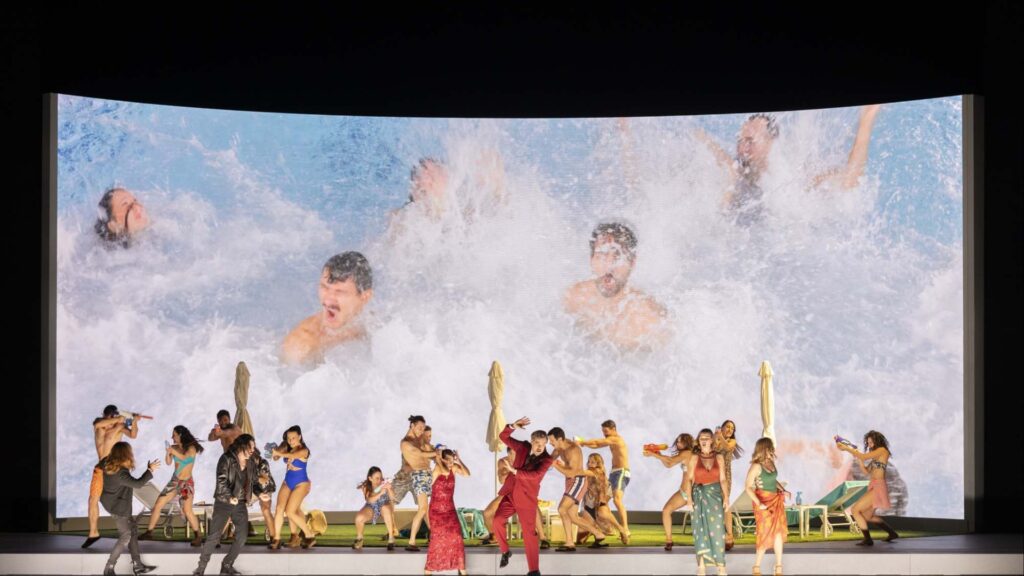
(Photo: © Vito Lorusso / Teatro alla Scala)
Illuminating Cast
The cast delivered strong stage presence, though with somewhat uneven vocal results. As Fiordiligi, Elsa Dreisig tackled a notoriously difficult role with mastery. She excelled in the register leaps of “Come scoglio,” displaying a flexible voice capable of moving seamlessly from low to high notes. Her interpretation conveyed determination, and in the rondò “Per pietà, ben mio, perdona,” set in a Big Brother-style confessional, she achieved greater emotional balance and authenticity, even if the aria did not reach its fullest lyrical potential vocally.
Nina van Essen as Dorabella offered a solid performance both vocally and dramatically. In “Smanie implacabili,” she combined vivid, emotionally charged phrasing with a parodic touch that enhanced the work’s comic spirit. Her Dorabella was capricious and bright, especially in “È amore un ladroncello,” where she sang with ease and charm.
The choice of a mature Despina proved highly effective, reinforcing the idea that manipulating the young requires malice and experience; a too-young Despina would lose psychological weight. Thus Sandrine Piau was cast. With a confident and well-acted stage presence, she nonetheless showed occasional vocal weakness and strident high notes. Her “In uomini, in soldati” was engaging, and “Una donna a quindici anni” light and ironic, highlighting the character’s theatrical savvy.
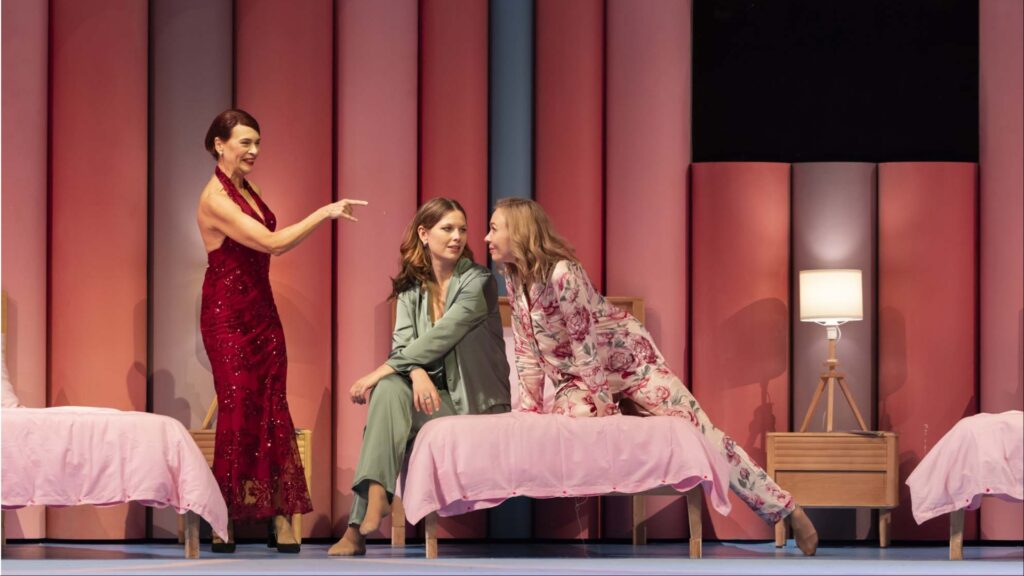
(Photo: © Vito Lorusso / Teatro alla Scala)
Luca Micheletti as Guglielmo delivered an acceptable stage presence, though vocally uneven compared with his recent performances in the house. He did not sing the demanding “Rivolgete a lui lo sguardo,” replaced–as is customary–by “Non siate ritrosi,” performed competently, as well as “Donne mie, la fate a tanti.” His portrayal was energetic and effective, but at the expense of the phrasing, softness and even innocence the role requires. Nonetheless, his acting remained aligned with the director’s vision. Giovanni Sala, as Ferrando, left a bittersweet impression. He possesses elegance, a uniform legato and solid acting, though his tone tightens in the upper register. “Un’aura amorosa” was sung with seduction and passion, while in “Tradito, schernito” he stood out more for his acting, powerfully expressing the character’s anger in a television confessional.
The captivating timbre and innate musicality of Gerald Finley stood out as Don Alfonso, though the characterization, intentionally more superficial to fit the role of a TV host, limited his usual subtle cynicism and irony. The intelligent ambiguity that typically defines this part was somewhat missing. Even so, he compensated with impeccable Italian diction and rounded, precise and healthy singing
In the pit, Alexander Soddy conducted with brilliance, energy and precision. His clear understanding of the Mozartian style yielded a dynamic and transparent sound. “Soave sia il vento” and “Per pietà, ben mio, perdona” were particularly lyrical and refined, while the overture, “Smanie implacabili” and the final ensembles were delivered with vigor and accuracy. La Scala’s orchestra responded with cohesion and delicacy, as did the chorus under Giorgio Martano’s indications.
This production reminds us that, despite the passing centuries, human beings continue to experience the same emotions and vulnerabilities. What has changed is the world around us—the ways we relate and the manner in which love, jealousy and shame are publicly and media-wise exposed. The bleak reality of today’s television proved to be an effective and surprisingly functional frame for the staging. The final ovations, amplified by the enlarged faces of the protagonists projected on the giant screen, crowned an evening warmly received by the audience.
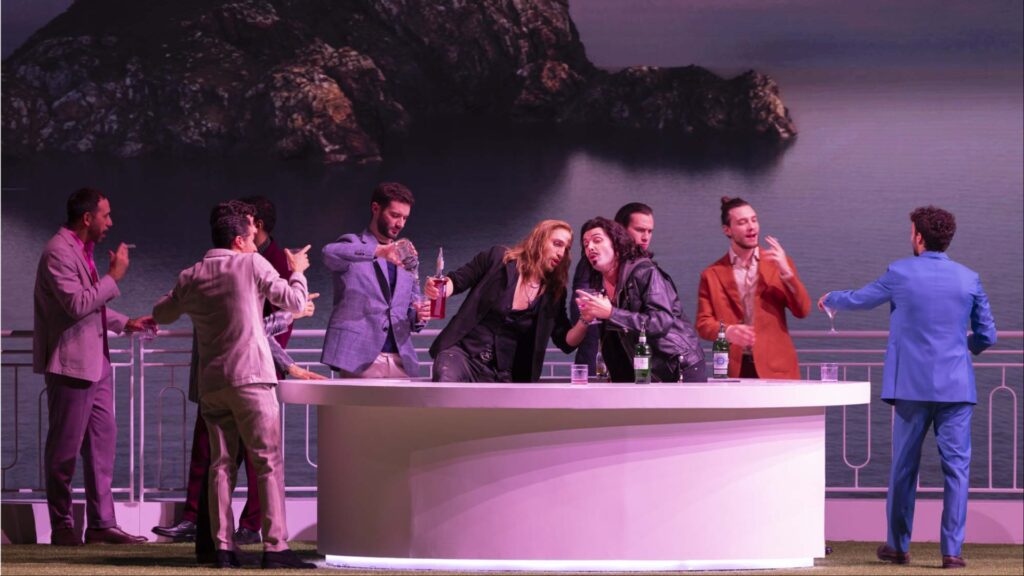
(Photo: © Vito Lorusso / Teatro alla Scala)

